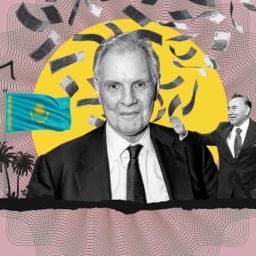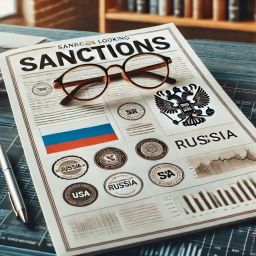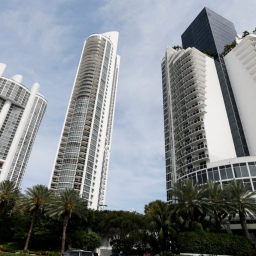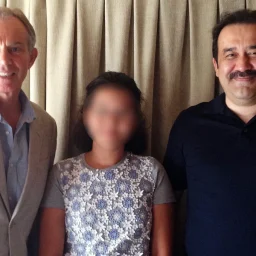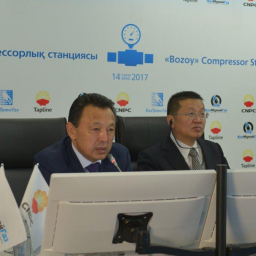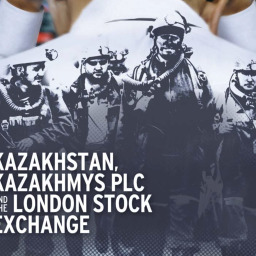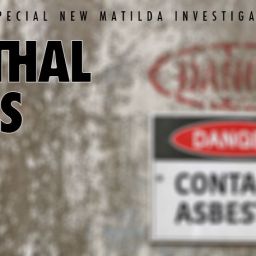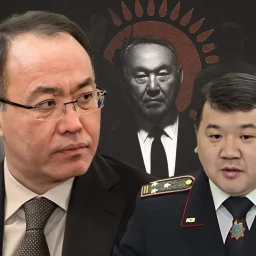An MP and a campaigner call for authorities to investigate anonymous loans to the UK firm, which until last year controlled a top chemicals and mining company in Kazakhstan.
LONDON
Amid all the hard talk about the urgency of stopping dark money from entering the UK from countries with a history of high-level corruption, untransparent transactions made by a Kazakh mining giant registered in Britain remain unscrutinised.
The data has been made public on the UK’s corporate register, Companies House, but has not been reported in the media previously.

The company in question is Kazphosphate, created in 2006 in the UK as a holding for a top Kazakhstan phosphate mining operation, according to UK corporate filings. For the duration of the transactions, between 2007 and 2019, its beneficial owner was Galimzhan Yessenov, a wealthy Kazakh businessman who at the time was the son-in-law of Akhmetzhan Yesimov, an influential government official, chair of the sovereign wealth fund of the country, and husband of the daughter of then-dictator Nursultan Nazarbayev.
Nazarbayev was deposed of power in January last year after violent protests in Kazakhstan.
These transactions sat in plain sight of the UK government and regulators for years, and were first brought to public attention in February 2022 after a brutal crackdown on protests against Kazakhstan’s repressive regime prompted calls for sanctions against the country’s elite.
Dame Margaret Hodge, a prominent Labour MP and one of the staunchest voices calling for sanctions, at the time named a series of Kazakhs who have connections to the UK corporate services sector. Among them were Yessenov and his former father-in-law.

“Akhmetzhan Yesimov, chairman of the sovereign wealth fund, allegedly abused his position to give his former son-in-law, Galimzhan Yessenov, related party loans through secretive British Virgin Islands companies to buy a UK entity called Kazphosphate. Yessenov is now one of Kazakhstan’s richest men,” said Hodge in Parliament last February, in a wide-ranging speech criticising the alleged corruption of Kazakh elites and their Western helpers.
Yessenov denied any impropriety and Yesimov could not be reached for comment. There is no suggestion that either of them acted illegally nor have they been officially accused of any wrongdoing.
Yessenov took over Kazphosphate using an unsecured, interest-free loan from a party related to him in the amount of $141 million, as evidenced by the firm’s 2007 and 2008 financial accounts published in the UK. This was composed of $131 million from Kennon Finance Ltd, a shell company registered in the British Virgin Islands, $9.4 million from Drewes Management Ltd, registered in Seychelles, and Daryn LLC with $6.6 million. The loans from Drewes and Kennon had “no fixed repayment date,” the filings said, adding that the companies in question “are related parties to Kazphosphate Plc by virtue of common ownership.”
The acquisition and loan coincided with Yessenov becoming Yesimov’s son-in-law that same year.
The Kazphospate loans mentioned above had been paid down to $108 million in 2015, at which point another offshore entity classified as related to Kazphosphate’s beneficiaries, Disport International Ltd, registered in the Marshall Islands, stepped in with another loan of $108.8 million to the company, the annual report for that year shows, without specifying the terms of the loan.
Also in 2015, Disport lent $20 million to Deverel Finance, a company registered in the British Virgin Islands, according to documents leaked to the International Consortium of Investigative Journalists (ICIJ) and shared with Reporter. The ultimate beneficial owner of Deverel or Disport was not recorded in the loan agreement, but the account where the loan was due to be paid was at CBH, a Swiss private bank. Another contract from the same year leaked to the ICIJ shows that Disport borrowed $7 million from Deverel under similar terms, through the same accounts at CBH in Switzerland.
Fast forward to 2019, and Kazphosphate simply buys Disport outright, the shell company it owed money to and which its owners had an admitted connection with. This transaction also bears several defining characteristics, found within the annual report published by the company to cover the financial year of 2019.
Disport’s entire share capital was bought by Kazphosphate for $1 on September 13 of that year, and two weeks later on October 28 the phosphate giant bought another 136.8 million newly-created Disport shares at $1 a pop, only to sell the entire consideration on December 30, 2019 for $1.
“We have been unable to obtain sufficient explanation of the commercial reasoning for these transactions,” designated auditor Yogan Patel from MHA Macintyre Hudson wrote in his opinion, as he booked an $87.7 million loss for Kazphosphate in 2019.
In the same declaration attached to the report, the accountant said of the Disport transaction: “we have been unable to obtain sufficient evidence to confirm that this transaction resulted in the company obtaining control and that this control was not transitory in nature.”
More generally, the auditors of Kazphosphate in 2019 “were unable to determine whether adequate accounting records have been kept,” according to the statement.
The UK company appears to have been separated from the Kazakh phosphate operation as of 2021, according to the latest statement of accounts, issued in December 2022. “The directors intend to allow for the company to be placed into members voluntary liquidation in due course,” the document says. The Kazakh mining and processing operations continue under another structure and new ownership after the UK company sold them for $612 million in May 2021.
The Kazphosphate transactions had been flagged to the Swiss financial regulator, according to a report last year in Swiss newspaper Sonntag Zeitung.
London life

London-based SH Landes and MHA MacIntyre Hudson have been the accountants and auditors, respectively, of Kazphosphate, over the entirety of the period of these transactions and until 2021. The auditors reports were “qualified” – which is to say not fully supportive of the claims in the company’s books – for nine of these 14 years, while an opinion was withheld entirely for 2019 for lack of supporting evidence provided by their client.
SH Landes has carried out other activity for the Central Asian elite. It also acted for Dariga Nazarbayeva, another wealthy Kazakh with valuable assets held in the UK, separate corporate filings show. Nazarbayeva, the daughter of Nursultan Nazarbayev, has been connected by British media with a failed financial firm that specialised in facilitating investor visas to the UK. Nazarbayeva won a claim against the National Crime Agency in 2020 after the law enforcement body imposed a freezing order on properties linked to her in the UK valued at over £80 million. There is no suggestion of illegality on her part or on the part of SH Landes.
Meanwhile, a March 2023 report from Freedom for Eurasia, an NGO, said SH Landes also worked for proxies of Gulnara Karimova, a controversial Uzbek “princess,” in several business deals even as she was being publicly accused of corruption, which she denied.
In response to a question about Kazphosphate, Dame Margaret Hodge MP told Reporter: “Kazakhstan has long had a problem with corruption. That’s why earlier [last] year I gave a speech in Parliament demanding that the UK Government issue sanctions against the political elite in the region that have robbed from their people to fill their own pockets. Now these latest revelations suggest that UK companies are still being abused to facilitate the flows of potentially corrupt or illicit finance out of Kazakhstan. I urge UK law enforcement to look into this case.”
Thomas Mayne, a campaigner and associate fellow at Chatham House as well as a research fellow at the University of Oxford, who has co-authored an influential recent report into the risks of corruption inherent in Kazakh-linked wealth in the UK, told Reporter the shell company lending to Kazphosphate and subsequent takeover of Disport highlighted in the Companies House filings “is incredibly strange.”
“Why provide an unsecured loan to a guy in his mid 20s with no track record? The beneficial ownership of the loan companies is not known but related to the Kazp[hosphate] ownership. So they are lending money to themselves? Where was this money from?” questioned Mayne via email.
“The fact that these loans still lead to a loss coupled with the possibility of inadequate accounts would be a reason [for the authorities] to investigate the nature of this company’s dealings. There is a danger that the company is being used for capital flight.”
Mayne added: “London has had an open door policy for years on dubious cash, only realising the folly of that position with regard to Russia after it invades Ukraine, but maybe the penny has not yet dropped with Kazakhstan and other countries.”
Yessenov lost control of Kazphosphate together with other financial interests soon after his divorce in 2020. He remains listed on Companies House filings as one of the “persons with significant control” at Kazphosphate, alongside his ex-wife Aizhan Yessim, who now owns “more than 25% but not more than 50%”.
“The UK has strong anticorruption laws but they are useless if not enforced. We see very few enablers being investigated although there are lots of rules against enablers,” Mayne said. “The UK is at a crossroads, it needs to look at itself and decide if it wants to continue allowing dirty money. My fear is a lot of people in power would think we can’t afford to give it up in an economic crisis.”
There is no suggestion that Yessenov has done anything illegal in relation to these transactions. Kazphosphate’s press office did not respond to emailed requests for comment.
An in-house lawyer of Mr Yessenov’s companies group, Timur Janabayev, responded via a Proton Mail account to a right-to-reply email Reporter sent to the public address listed on the website of the Yessenov Foundation.
Janabayev denied on behalf of Kazphosphate and Yessenov that Kazphosphate had engaged in suspicious transactions, adding that “the purchase of Kazphosphate had been financed by a public bank which had pledged assets of Mr Yessenov. The use of several companies had mere legal business reasons, which do not raise any suspicion of inconsistencies”. He did not answer Reporter’s question about the economic reason for using offshore structures, nor the reason the full information underlying these structures was not disclosed to Kazphosphate’s own accountants, as per the company’s own annual reports.
Janabayev also appeared on a Swiss memo obtained by Reporter through the ICIJ databse as the liquidator of Drewes Management, with effect from February 2016.
Thanks to B.M. for his help editing this article.
Author: Matei Rosca
Original article: Reporter London




